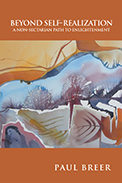
 |
A teacher named Richard conducts classes on self-realization to a variety of students in this intriguing look at the path to self-realization freed from the fetters of organized religions. Relinquishing the individual “I” is a transcendent concept intersecting psychology, intellect, and spirituality. Richard offers exercises, advice, wisdom from many sources, and his personal experience to convey his ideas to his students. His comprehensive method includes meditation and other exercises. Much is learned in open discussion with the students whose believable personalities offer unique perspectives. Richard gently guides them to understand that enlightenment, Being, or Pure Consciousness can be reached by divesting oneself of ingrained, illusory notions of control and by coming into acceptance of what it is already there. He reminds them that enlightenment doesn’t give answers; it simply stops questions from arising. As the class progresses, his students gain a grasp of these far-reaching concepts.
Breer, a retired university professor and psychotherapist, has written about related subjects from a fictional viewpoint. He constructs a ponderous work of fiction that also cites well-regarded source material, focusing on a rational search for truth. Through the device of teaching a class for adults, he offers ideas and resources for anyone intent on understanding the central theme: attaining enlightenment by divesting one’s individual self or ego. Each of the students exemplifies certain viewpoints that allow the examination of this theme across a broad spectrum, as the teacher/author skillfully tackles a variety of questions, challenges, and arguments. The author does not style his teacher as the ultimate expert but shows him dealing with the arising concerns spontaneously while sharing his own practices as learning models. In the process, the reader can see growth and change developing. This intelligent structure and the practical methodologies devised by Breer should attract a serious readership.
RECOMMENDED by the US Review